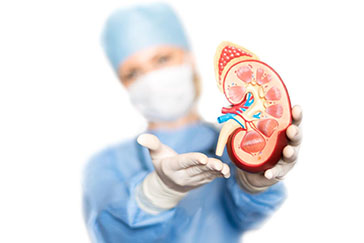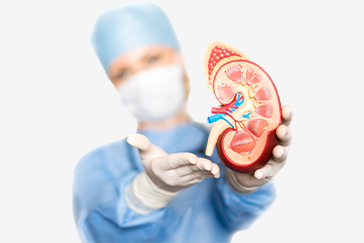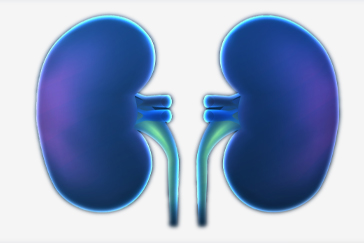 Book Appt.
Book Appt.
 Call Now
Call Now


A living-donor kidney transplant involves taking a kidney from a living individual and giving it to someone who requires it. The kidney recipient's kidneys have failed and are no longer working correctly. Only one kidney is required for wellness. As a result, a living individual can donate a kidney while maintaining his or her health. A living-donor kidney transplant is an alternative to getting a deceased donor's kidney. A family member, acquaintance, or even a stranger may give a kidney to someone in need.
Why it is done
People with end-stage renal disease have kidneys that are no longer functional. People with end-stage renal disease require waste removal from their bloodstream to keep alive. Dialysis is a machine-based method for removing waste. Another option is to have a kidney transplant. Most persons with advanced renal disease or kidney failure choose a kidney transplant. In comparison to a lifetime on dialysis, a kidney transplant has a lower chance of death and more dietary possibilities. There are certain advantages to having a living-donor kidney transplant rather than a deceased-donor transplant. The advantages of a living-donor kidney transplant include a shorter waiting time, avoiding dialysis if it has not been started, higher survival rates, and the transplant can be scheduled ahead of time provided the donor is authorized.
Risks
Living-donor kidney transplants carry the same risks as deceased-donor kidney transplants. Some of the hazards are comparable to those associated with any surgery. Others are concerned with organ rejection and the negative effects of anti-rejection medicines. Pain, infection at the incision site, bleeding, blood clots, and organ rejection are all potential risks. This is characterized by fever, tiredness, decreased urine flow, and soreness and tenderness around the new kidney. Side effects of anti-rejection medications. These include hair growth, acne, weight gain, cancer, and an increased susceptibility to infection.
How to prepare
If your doctor advises a kidney transplant, you will be directed to a transplant clinic. You have the option of selecting a transplant center on your own or from your insurance company's preferred provider list. After selecting a transplant center, you will be screened to see whether you meet the center's eligibility requirements. The evaluation may take several days and will involve a comprehensive physical exam, imaging tests such as X-rays, MRIs, or CT scans, blood tests, cancer screening, psychiatric evaluation, assessment of social and financial support, and any additional testing dependent on your medical history.
What to expect
Results
After a successful kidney transplant, your new kidney will filter your blood and remove waste. You will not need dialysis. You will take medicines to prevent your body from rejecting your donor kidney. These anti-rejection medicines suppress your immune system. That makes your body more likely to get an infection. As a result, your doctor may prescribe antibacterial, antiviral, and antifungal medicines.
It is important to take all your medicines as your doctor prescribes. Your body may reject your new kidney if you skip your medicines even for a short period of time. Contact your transplant team immediately if you have side effects that keep you from taking the medicines. After the transplant, be sure to perform skin self-checks and get checkups with a dermatologist to screen for skin cancer. Also, staying up to date with other cancer screenings is strongly advised.
Conclusion
Living donor kidney transplants provide an excellent treatment option with superior outcomes and shorter waiting times. They rely on the generosity of donors, careful medical evaluations, and advanced surgical techniques. This approach can save lives and restore health, offering hope to patients with end-stage renal disease.
SHALBY Sanar International Hospitals provides extensive medical procedures backed up with our state-of-the-art technology and a team of highly qualified & experienced clinical experts.

Patient from Indonesia gets Kidney Transplant | SHALBY Sanar Interntional Hospitals

Patient from Indonesia gets Kidney Transplant | SHALBY Sanar Interntional Hospitals

Successful Kidney Transplant of a patient by Dr Amit Kumar

Successful Live Renal Allograft Transplant: Mr. Zaid's Journey to Recovery by Dr Amit Kumar Yadav

Life Renewed: Mr. Evans Elieza Aveva's Remarkable Kidney Transplant Journey

A successful Kidney Transplant gives Mr. Tache from Ethiopia, a new beginning

Successful story of kidney transplant I #kidneytransplant #patient testimonial
Our doctors pen down their research findings and experiences from time to time. Their words provide deep insight into the latest techniques, technologies and other advancements in healthcare. It provides expert answers to all kinds of health questions for real-life issues.
VIEW ALL




Since the day of its foundation, SHALBY Sanar International Hospitals is committed to provide comprehensive healthcare services. It regularly organizes awareness programs in its premises and encourages outdoor healthcare activities and camps with an intent to put focus on preventive healthcare.
VIEW ALL